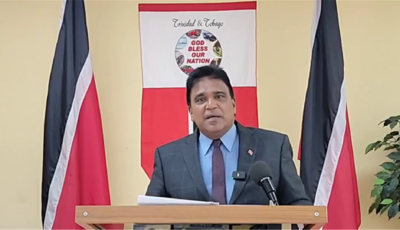HEADLINES
Commentary
Rowley strenuously objected to the construction of Penal-Debe UWI Campus
The media is reporting that the UWI Penal-Debe Campus, built during the People’s Partnership Administration continues to sit empty and has never
Posted On 30 Oct 2023
Blighted WGTL Project continues to haunt PNM
That World Gas-to-Liquids project is another of the many PNM scandals and failed projects which has cost taxpayers billions of dollars! And it is
Posted On 22 Jun 2023
Who financing Balisier House?
Ferdinand Ferreira, a founding member of the People’s National Movement (PNM), is quoted in the media as saying that the party has always
Posted On 03 Apr 2023
UNC SENATORS DEFENDED THE PARTY WELL TODAY
Today, the Opposition UNC Senators defended themselves and the Party well from the frivolous, anti-democratic motion by Senator Anthony Viera.
Posted On 22 Feb 2022
COVID WORKERS FIGHTING A WAR WITHOUT THEIR PROPER WEAPONS
We congratulate Kamla Persad-Bissessar on her success in forcing the Government to conduct an inquiry into the handling of covid. We take this
Posted On 20 Feb 2022
Letters
For fools rush in where angels fear to tread
The National Security Minister’s recent unrestrained language and conduct towards judges and unjustified criticisms of their judicial functions
Posted On 14 May 2023
Seek a fresh mandate
I recently read in one of the daily newspapers that Minister of National Security Fitzgerald Hinds said that 70% of society wants to see him
Posted On 27 Dec 2022
Don’t Blame God for Rowley’s Dotishness
Prime Minister Keith Rowley at the PNM convention on December 4, 2022, announces a National Day of Prayer. He said the country must come together
Posted On 16 Dec 2022
Keith Rowley has betrayed the sanctity of Parliament
Dear Editor, The revelation by the Commissioner of Police that the emails which Keith Rowley, then Opposition Leader read in our nations
Posted On 19 Jul 2019
T&T owes Kamla a debt of gratitude
Kamla Persad-Bissessar did what many were not expecting… she and her MPs voted unanimously with the Government to ensure passage of the Civil
Posted On 09 Apr 2019
Press Releases
Tancoo: Flooding imminent as Government fails to act
After a couple days of scattered “April showers” earlier this week, MP for Oropouche West, Dave Tancoo is again warning that severe flooding in
Posted On 06 Apr 2024
MP Khadijah Ameen wants justice for Kiss Driver’s death
Member of Parliament for St. Augustine, Ms. Khadijah Ameen is calling for justice for the death of Kiss delivery driver, Neil Ballai. Ballai was
Posted On 06 Apr 2024
UNC’s Persistent Pressure Forces Rowley Gov’t to Release 2024 EBC Report
On the heels of intense, consistent pressure from the UNC over their highly questionable refusal to lay the 2024 EBC Boundaries Report in
Posted On 06 Apr 2024
Moonilal: Hinds Fails Fire Service, Lives at Risk as Equipment Crumbles
The collapse of the Trinidad and Tobago Fire Services is another crushing indictment on the spectacularly failed Fitzgerald Hinds as Minister of
Posted On 05 Apr 2024
Padarath: Gov’t Electricity Rate Hike “Unbearable Burden”
Princes Town MP, Barry Padarath said that the contents of a report in yesterday’s Business Guardian headlined “RIC Recommends
Posted On 05 Apr 2024
Speeches
Tancoo: calls on Imbert to have a heart and indemnify the population
Today we come to you to shine some light on a very worrying development that has happened in the past few days. I am sure many of you saw or
Posted On 08 Sep 2021
Rowley’s Mad Power Grab in Tobago
My friends, we are seeing a government that is in freefall – in every single sector. Health, National Security, the business sector. And what
Posted On 16 Feb 2021
Presentation of UNC general election candidates 2020
T&T family! UNC family! It is my absolute pleasure to speak with you today, as we get ready for the sweeping victory that is to come on
Posted On 19 Jul 2020
Kamla: My vision is to build an intelligent nation
“ON THE BALLOT” UNC VIRTUAL MEETING (June 25, 2020) Introduction Good evening and thank you for joining us once again as we continue to set the
Posted On 26 Jun 2020
MNF – Kamla: There is hope
Introduction Good evening T&T! Good evening UNC family! It is good to be back! 2020 we are ready to rumble! Are you ready? Even though it’s
Posted On 11 Mar 2020
Copyright © - 2023 United National Congress







Ramnarine: Juniper’s First Gas, work of the PP government
Kevin Ramnarine
FORMER MINISTER OF ENERGY AND ENERGY AFFAIRS, TRINIDAD AND TOBAGO
Juniper’s first gas date has been three years in the making. BP approved the project in mid-2014 and TOFCO started construction of the platform in November 2014. Its approval was predicated on many factors. The largely misunderstood accelerated capital allowances that were in the Finance Bill of 2014 played no small role. When it is up to its full production capacity, Juniper will produce 590 million cubic feet of natural gas per day which is an 18% increase in natural gas production. That is a significant increment of natural gas which will effectively end the recession albeit temporarily.
There has been much criticism of the fiscal incentives that were put in place during my tenure as Minister of Energy. Had the Government not intervened between 2011 to 2014 and made major changes to the fiscal regime we would not have a Juniper project nor would we have had the recently celebrated exploration success.
The Prime Minister is not a fan of these incentives. He is of course entitled to that opinion. On his return from Chile he said, “We disagree fundamentally with what they call incentives. We told BP (in Houston) that had the Government of Trinidad and Tobago been a People’s National Movement Government there was no way we would agree to that.” The Prime Minister perhaps forgot that the then PNM Opposition voted for these incentives on April 5th, 2014. In fact, during debate on that Finance Bill, on April 4th, 2014, the MP for Diego Martin North East (now Minister of Finance) said, “it is about time these fiscal incentives were put in place.” It is also noteworthy that while the PNM Government publicly disagrees with the accelerated capital allowances, they have left them on the statue books for 21 months.
The accelerated capital allowances and other major fiscal incentives are responsible for the upsurge in drilling and exploration activity in recent years. The Minister of Finance admitted as much when he spoke during the mid-year review on April 8th, 2016. In that speech he said, “The incentives, Madam Speaker, did what they were supposed to do, they stimulated investment. But the flip side of that is that with depressed oil prices these oil companies are now paying no income tax to the Government in fiscal 2016.”
On this issue Mr. Imbert is right and wrong. He is right that the incentives stimulated investment. On the issue of its impact on taxes he is inaccurate. It is a fact that some major oil and gas companies have not paid much taxes in 2015 and 2016. However, that has more to do with low prices and the fact that they recorded losses in 2015 and 2016. A company making losses has no profit and hence no “taxable income” against which they can apply capital allowances. So, the accelerated capital allowances did their job. They stimulated investment but should not be blamed for lower taxes from oil and gas companies.
What about Government revenue going forward in fiscal 2018? The Minister of Finance should know that there is the concept in tax of “carry forward losses”. This means companies can carry forward losses into the future, use them to lower taxable income and pay less taxes. Provision is made for this in Section 16 of the Income Tax Act. This will no doubt affect our revenue forecast for 2018 as Petroleum Profits Tax (PPT) are likely to be impacted by carry forward losses.
The other major tax in the oil and gas sector is Supplemental Petroleum Tax (SPT). This is calculated as a percentage of gross revenue and is only payable if oil prices average above $US 50 per barrel for an entire quarter. Some experts believe that oil is unlikely to get much higher than $US 50 per barrel anytime soon. The Minister of Finance should therefore not count on receiving any SPT in fiscal 2018. He has, in fact, received very little SPT in fiscal 2017 thus far.
In this low-price environment companies are in survival mode. The oil and gas industry is cyclical – feast or famine. With these low prices, it is difficult to contemplate how Petrotrin could survive without borrowing to fund operating expenditure. Petrotrin has one of the world’s highest breakeven cost for producing a barrel of oil. Any plan to address the future of Petrotrin must provide strategies for managing its costs downward.
Juniper’s first gas is much welcomed. I commend the work of BP but a lot more remains to be done if we, as a nation, are to weather the gathering storm.
Kevin Ramnarine
FORMER MINISTER OF ENERGY AND ENERGY AFFAIRS, TRINIDAD AND TOBAGO
June 28 2017
Share this:
Like this:
TTNGL the Sequel
The Politics of Distraction and Bias
Commentary
Rowley strenuously objected to the construction of Penal-Debe UWI Campus
Blighted WGTL Project continues to haunt PNM
Who financing Balisier House?
UNC SENATORS DEFENDED THE PARTY WELL TODAY
COVID WORKERS FIGHTING A WAR WITHOUT THEIR PROPER WEAPONS